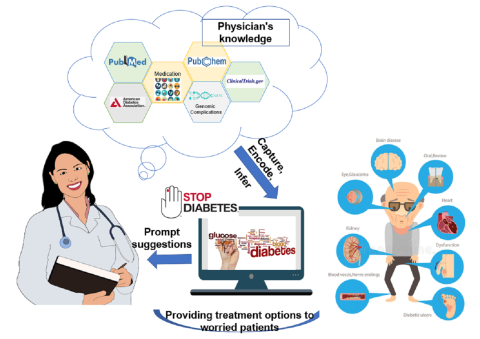Instructor: Professor Deborah McGuinness - dlm at cs dot rpi dot edu
Guest Lecturer: Ms. Elisa Kendall - ekendall at thematix dot com
Guest Lecturer: Dr. Jim McCusker - mccusj2 at rpi dot edu
Course Manager: Ms. Rebecca Cowan - cowanr at rpi dot edu
Meeting times: Monday afternoon 1:00 pm - 3:50 pm.
Office Hours: By appt by skype or in person in Winslow 2104
phone: 518-276-4404
Class Listing: Ontologies
CSCI 6967 - 01, 98441, CSCI 4968 - 01, 95541
Class Location Winslow 1140
Description: This course provides an introduction to ontologies, their uses, and an overview of their application in semantically enabled systems. Ontologies encode term meanings. Ontologies with their declarative encodings of meaning can be used to improve communications between people and can enable computer programs to function more effectively. They provide the foundation for clear and unambiguous interaction. Ontologies have become increasingly common on the web, and class participants will not only learn about the use of ontologies in web-based applications but how to evaluate ontologies for reuse in such applications. Participants will read relevant papers, learn how to critically review ontology papers as well as ontologies themselves, and will participate in at least one group project designing, using, and evaluating ontologies.
Goal:
To learn how to build computer understandable definitions of terms for usage in automated systems.
Objectives:
- Learn what ontologies are, how to build them, and how to use them
- Learn what use cases are, how to construct them, and how to use them to capture requirements for ontology and applications development
- Learn about terminology work, including definition development, and how to use terminologies as the starting point for ontology development
- Learn about ontology languages and some existing ontology resources
- Learn how to design, implement, and evaluate an ontology project
Prerequisites:
- Basic knowledge of XML is expected
- Basic knowledge of Artificial Intelligence and the Web is expected
Assessment Criteria:
- Via written assignments
- Via oral (individual and group presentations)
- Via participation in class
- Via group evaluation
- Late submission policy: first time with valid reason – no penalty, otherwise 20% of score deducted each late day
Attendance:
- Attendance at all classes is expected. If you are sick and can not attend, please contact the professor in advance. The class includes many group participation activities and participation in class is included in the final grade evaluation. Missed classes are recorded will will impact grades.
Academic Integrity:
Student-teacher relationships are built on trust. For example, students must trust that teachers have made appropriate decisions about the structure and content of the courses they teach, and teachers must trust that the assignments that students turn in are their own. Acts, which violate this trust, undermine the educational process. The Rensselaer Handbook of Student Rights and Responsibilities defines various forms of Academic Dishonesty and you should make yourself familiar with these. In this class, all assignments that are turned in for a grade must represent the student’s own work. In cases where help was received, or teamwork was allowed, a notation on the assignment should indicate your collaboration. Submission of any assignment that is in violation of this policy will result in a penalty.
If found in violation of the academic dishonesty policy, students may be subject to two types of penalties. The instructor administers an academic (grade) penalty, and the student may also enter the Institute judicial process and be subject to such additional sanctions as: warning, probation, suspension, expulsion, and alternative actions as defined in the current Handbook of Student Rights and Responsibilities. If you have any question concerning this policy before submitting an assignment, please ask for clarification.
Course Syllabus
Google Doc Syllabus: link
NOTICE: remember to check back as the schedule may change as the term progresses
Current Group Projects:
Course: Ontology Engineering
Date: to




